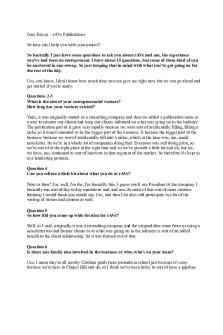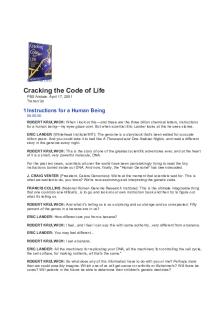The Odyssey - Part 2 transcript PDF

| Title | The Odyssey - Part 2 transcript |
|---|---|
| Course | World Humanities 1 |
| Institution | The City College of New York |
| Pages | 6 |
| File Size | 144.9 KB |
| File Type | |
| Total Downloads | 42 |
| Total Views | 147 |
Summary
World Humanities...
Description
World Humanities 101 Prof. Václav Paris CCNY, CUNY, Fall 2020 Odyssey Lecture Transcript Part 2 of 6 In the last video, I introduced Homer’s Odyssey by talking about: 1. Homer, the semi-legendary figure, who stands at the beginning of European civilization. 2. The background story of the Trojan War. I said that the story of the Odyssey is the story of the main character Odysseus’s return home to Ithaca. That is, his “nostos.” 3. I also said, however, that the book is not arranged simply as a voyage from Troy to Ithaca, rather the narrative structure is more complicated. The poem begins at its destination, with Odysseus’s son Telemachus in Ithaca, and the bad behavior of Penelope’s suitors. One reason for this, I said, was because a part of the Odyssey is educational. Ancient Greek listeners to and commentators on the Odyssey thought of it as a guide: a kind of textbook on how to be a good Greek. Now, I’d like to pick up on this theme again. - SLIDE There are two things in particular that the Odyssey teaches. I’m going to label these with two ancient Greek words: “polutropon” and “xenia.” Firstly, The Odyssey teaches us what a full, complex, grown-up man should be. Odysseus is clearly, from the beginning of the book, an exemplar or paradigm for male behavior. (I’ll talk in a later lecture about the double standard of this poem, but suffice to say here, it primarily offers a masculine and patriarchal worldview.) Odysseus’s wife, Penelope, on the other hand, is presented as the ideal of feminine behavior, but we’re going to see much less of her than we see of Odysseus. In what ways is Odysseus presented as exemplary? - SLIDE
1
Well, to begin, when the Goddess Athena goes to her father Zeus to ask him to save Odysseus, Zeus says, and this line 65 in the first book: Zeus says: “how could I forget Odysseus? He is more sensible than other humans and makes more sacrifices to the Gods.” Zeus likes him because he’s pious. Odysseus is also described throughout as crafty. In contrast to Achilles, the main figure in the Iliad, Odysseus’s primary merit is his intelligence. He’s definitely not a one-sided or flat character. He can deal with different situations in different ways: he can adapt who he appears to be. Homer signals this adaptability right at the beginning of the book. My translation begins: “Tell me about a complicated man, muse.” Now the Greek phrase here is: ἄνδρα µοι ἔννεπε, µοῦσα, πολύτροπον… which is actually very easy to translate up until the last word: andra: man – as in, anthropology. moi – to me ennepe – tell mousa – muse and then this odd word: polutropon which is the first adjective given to Odysseus. Literally it means something like “tell me about a man of many turns,” or a “variable man” but translators offer different versions including “resourceful,” “shrewd,” “experienced,” “versed,” “crafty,” “versatile,” “adventurous,” “restless,” “ingenious,” “wily,” “cunning” – and “complicated.” However you translate it, being “polutropon” is one of the two central virtues of the Odyssey. Much of the book teaches us how to be polutropon, as we’ll see when Odysseus deals diplomatically, say, with Nausikaa, on the island of the Phaeacians, when he manages to blind the Cyclops, or when he slyly manages to manipulate the suitors towards the end. Note, this ability also includes the capacity to lie. The morality in the Odyssey is not like ours. Lying well, or what the Greeks called metis is considered a positive skill.
2
This is also, importantly one of things that makes this poem so interesting in relation to other ancient epics. Instead of being exceptional for one thing – his strength, his fighting capacity, etc. – the hero of this poem is exceptional for being variable. In other words, he’s actually very much like a modern individual. Xenia - SLIDE The other thing that the Odyssey teaches us is about this term xenia. What is it? In its most basic definition xenia is the culturally and religiously maintained guest-host relationship in Ancient Greece. It’s a duty, and not a choice. How does it work? Imagine being a traveller in 8O0 BC – or even earlier, since the Odyssey, like the Iliad, is already set in the past in Homer’s day. There are no hotels, there’s no airbnb, or booking.com. There doesn’t even seem to be any money: we’re in a pre-cash era here. You need food, shelter, clothing, a bath. What do you do? Present yourself at the house of someone who is about your social status. “Here I am, put me up for the night.” Xenos = foreigner (someone from another town) – this sense of xenos gives us xenophobia. ONLY once you’ve been taken in, do you become a xenos in the sense of friend. The host is a xenos too. xenia is the relationship between the guest and the host. By the way, this relationship is also hereditary. it is supposed to be absolutely reciprocal. You help each other out. You give gifts. Guests should give gifts too. Reciprocity plays itself out in a broader sense, not straight away, but over time. What’s the problem with this system? It can only work if you know its rules and you don’t abuse them. 3
Consequently, there has to be something motivating you to uphold the rules of xenia and putting you off breaking them. Ultimately the thing that secures this system is religion. Zeus is the God of xenia. One of the goals of Homer’s Odyssey to teach us how to act according to xenia, and also what happens when the rules of xenia are broken. There are many examples. In fact, throughout the first four books the importance of xenia is a primary theme. I think you can already see various examples of where its working: In Book 1, for example, Telemachus’s welcome of Mentor (or Athena) from lines 135 to 191 is a great example. In Book 2, on the other hand, there are a lot of a counter-examples – points where xenia is clearly being abused by the suitors. The actions of the suitors Eurymachus and Antinoos in particular go against the requirements of Xenia. I invite you to look for other examples throughout the poem, including when Telemachus visits Nestor and Menelaus in books 3 and 4 and also, especially, when Odysseus is welcomed by the Phaeacians on the island of Scheria in books 6-8. ————————————— Okay, so the Odyssey teaches us about being versatile, polutropon, and about the divinely-sanctioned guest-host relationship of Ancient Greece, xenia. In the last five minutes of this video lecture, I’d like to turn, finally to Odysseus. We meet him in book 5, on the island of Calypso. - SLIDE I think you’re supposed to imagine this as a kind of paradise. It’s a beautiful island in the sunny mediterranean. Calypso is a beautiful immortal nymph, who has fallen in love with Odysseus and is giving him everything he wants. [Here’s a modern rendering alongside an Ancient Greek depiction.] Odysseus has the option of staying with her, in fact, she even offers him immortality.
4
This is the first of many temptations that Odysseus has to face on his way home in this poem. And perhaps many of you are thinking wow – I would take this option at a snap. What could be better? Eternal life, a Goddess, a private island. Odysseus, however, is unhappy, and turns down Calpyso’s offer. He does it politely (very diplomatically saying that Penelope’s not as good looking as Calypso) but he does insist that he wants to go home. He wants to go back to his place. Why? I think there are two things that Homer is underlining here. 1. Odysseus is loyal. Although he sleeps with various other women on his way home, he is loyal to his wife Penelope, to his homeland, and his son. He wants to go to his real home. 2. Odysseus knows the difference between mortals and Gods, and knows how dangerous it is to overreach this realm. Greek mythology is full of examples of figures who have suffered immensely because they tried to move between the mortal realm and the immortal realm. The most relevant example here is Tithonus. There was a Goddess, Eos, who fell in love with Tithonus. And she managed to give him eternal life. HOWEVER, she didn’t make him ageless as well. Consequently, Tithonus just kept getting older and older and older. After a few years, he’s just suffering, for eternity. Here are two images of Tithonus – again one from ancient Greece, and one from a later tradition. [By the way, this charming idea of an eternal torture, which you’ll meet again when you read Dante’s inferno, is very much an Ancient Greek, rather than a Catholic conception.] I think Homer wants us to recognize the danger here: and to admire Odysseus for being able to turn down Calypso’s offer diplomatically. It shows how wise he is, actually. Note also, that book 5 opens, as does book 1, with Athena asking Zeus to help Odysseus. It’s only when Hermes is sent down to Calypso to tell her to let Odysseus go, that he can finally leave. Homer is making it very clear that we are in the hands of the Gods, that the divine machinery is primary, and that we need to accept our place.
5
Okay, that’s all for this week. Make sure you do the multiple choice test, which will be on material that I’ve talked about in the first two video lectures. For next week, please read up to the end of The Odyssey, book 12.
6...
Similar Free PDFs

The Odyssey - Part 2 transcript
- 6 Pages

The Odyssey - Part 1 transcript
- 5 Pages

The Odyssey
- 7 Pages

Transcript 2
- 3 Pages

The Odyssey Reading Guide
- 1 Pages

Odysseus in The Odyssey
- 4 Pages

The Odyssey Homework
- 2 Pages

The Odyssey Research Paper
- 11 Pages

The Odyssey Books 5-8
- 2 Pages

The Odyssey Books 1-8-2
- 1 Pages

Homer - The Odyssey - Context
- 3 Pages

The Odyssey final essay
- 3 Pages

Odysseus - Summary The Odyssey
- 3 Pages

Tough Guise 2 Transcript
- 43 Pages

The Odyssey Paper #1 - A+
- 4 Pages
Popular Institutions
- Tinajero National High School - Annex
- Politeknik Caltex Riau
- Yokohama City University
- SGT University
- University of Al-Qadisiyah
- Divine Word College of Vigan
- Techniek College Rotterdam
- Universidade de Santiago
- Universiti Teknologi MARA Cawangan Johor Kampus Pasir Gudang
- Poltekkes Kemenkes Yogyakarta
- Baguio City National High School
- Colegio san marcos
- preparatoria uno
- Centro de Bachillerato Tecnológico Industrial y de Servicios No. 107
- Dalian Maritime University
- Quang Trung Secondary School
- Colegio Tecnológico en Informática
- Corporación Regional de Educación Superior
- Grupo CEDVA
- Dar Al Uloom University
- Centro de Estudios Preuniversitarios de la Universidad Nacional de Ingeniería
- 上智大学
- Aakash International School, Nuna Majara
- San Felipe Neri Catholic School
- Kang Chiao International School - New Taipei City
- Misamis Occidental National High School
- Institución Educativa Escuela Normal Juan Ladrilleros
- Kolehiyo ng Pantukan
- Batanes State College
- Instituto Continental
- Sekolah Menengah Kejuruan Kesehatan Kaltara (Tarakan)
- Colegio de La Inmaculada Concepcion - Cebu
